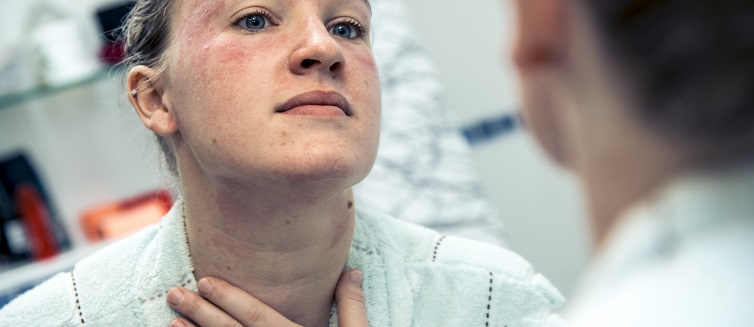If you repeatedly experience a red flushing on your face, you may have rosacea.
What is Rosacea?
Rosacea is a common skin condition of the face. People with rosacea experience flushes of redness and sometimes small, pimple-like bumps. These symptoms may come and go, and generally worsen over time.
Never Miss a Beat!
Subscribe to Our HealthBeat Newsletter!
Thank you for subscribing!
You can now select the specific newsletters you'd like to receive.
You are already subscribed.
Subscribe to more newsletters in our email preference center.
Sorry, an error occurred. Please try again later.
Get Healthy Tips Sent to Your Phone!
Who Can Get Rosacea?
Rosacea is a common condition that can affect anyone; however, it is more prevalent in:
- People with fair skin, although it can go undiagnosed in people with darker skin.
- Women, but men often experience more severe symptoms.
- Middle-aged and older adults.
Symptoms of Rosacea
The signs of rosacea include:
- Redness on the cheeks, nose, chin, and/or forehead that gets darker and more persistent over time.
- Sensitive, dry skin that burns or stings, or skin that becomes rough and thick.
- Visible blood vessels.
- Bumps and pimples.
- Swelling, especially on and around the nose (a condition called rhinophyma).
- Itchy, dry, watery, and/or bloodshot eyes.
- In some case, red patches on the neck, chest, scalp, or ears.
Risk Factors for Rosacea
No one is sure what causes rosacea, although there is evidence that it may be hereditary. Anyone can develop rosacea, but you may be more prone to it if you:
- Are female.
- Are over age 30.
- Have fair or sensitive skin.
- Have had extensive sun exposure, which can damage the skin and blood vessels.
- Have a history of acne, especially with cysts.
- Have a family history of rosacea.
When to See a Dermatologist for Rosacea Treatment
If you experience redness on your face that won’t go away — especially if your skin is dry and irritated, or you start to develop pimple-like bumps — you should see a dermatologist.
The pattern of redness typical of rosacea is distinct, so the doctor may diagnose it without further medical tests.
There is no known cure for rosacea, but a variety of treatment methods can help control or reverse the symptoms.
Because rosacea takes different forms with different combinations of symptoms, talk to a dermatologist to determine the best treatment options for you.
Living With Rosacea
Rosacea affects about 14 million people in the United States. While there is no cure for this condition, there are several medications and treatments. See your doctor or dermatologist to determine the best option for you.
Rosacea can flare up due to several common triggers, including:
- Emotional stress
- Extreme temperatures
- Strong wind
- Spicy food
- Hormonal changes
- Sunlight exposure
- Skincare products
- Alcohol consumption
If you notice a flare up, consider making a record of anything you’ve eaten or drunk, or any kind of products you used on your skin or hair.
Rosacea also can be triggered by a certain activity. Bring these records to consultations with your doctors to better determine what could be causing your flare ups.
Medicine for Rosacea
Treatment to soothe and control rosacea may include:
- Prescription medicines — Topical medicines such as brimonidine can help to reduce redness caused by rosacea. A doctor also may prescribe an antibiotic to help reduce inflammation. Some acne medications also may help to clear symptoms of rosacea.
- Laser therapy— This treatment can reduce the appearance of large blood vessels. Dermabrasion and intense pulsed light therapy also can help treat visible blood vessels.
- Topical products for sensitive skin — You can protect your skin with moisturizers and sunscreens made for sensitive skin. A sensitive skin formula can help if your skin is irritated and uncomfortable with dry, rough patches or a burning sensation.
- Artificial tears:If rosacea makes your eyes red, dry, and irritated, using artificial tears or prescription eye drops may help.
Do you think you have rosacea? Talk to a UPMC dermatologist. Get expert skin care anywhere in Pennsylvania with UPMC eDermatology.
Editor's Note: This article was originally published on , and was last reviewed on .
About Dermatology
The UPMC Department of Dermatology diagnoses, treats, and manages numerous hair, skin, and nail conditions and diseases. We care for common and uncommon conditions, and our treatments include both surgical and nonsurgical options. We operate several specialty centers for various conditions. The UPMC Cosmetic Surgery and Skin Health Center is a comprehensive dermatologic laser facility, offering a full range of cosmetic services and procedures. With UPMC Hillman Cancer Center, we offer a Skin Cancer Program that provides complete care from screenings, diagnosis, treatment, and beyond. Find a dermatology provider near you.
